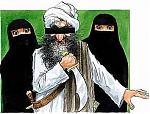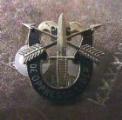If we see the Karzai government as a functionally independent entity that is not a product of our presence and is not entirely sustained by our presence, that's true. I'm not sure that's the prevailing perception in Afghanistan, and I'm not sure it's an accurate perception. Forget about what we want to see, what's the reality: is the Karzai government "theirs" or is it "ours"?
If the Karzai government is basically capable of governing but just needs a bit of help, if the ANA is basically capable of confronting the insurgency and just needs a bit of help, if the ANP is basically capable of maintaining order but just needs a bit of help... then absolutely our role is purely FID. If we're in a place where it's either done by us or not done at all, then our role is something else altogether. Do any of those conditions actually prevail?
If Karzai's loss is accompanied by a return to the status quo ante that led us to intervene in the first place, Karzai's not the only one who loses.
I agree, absolutely. The time to think about that, though, was before we went around installing governments, not after.
I think we learned the wrong lesson, not just from Vietnam, but from the entire Cold War experience. We emerged from the Cold War with a belated acknowledgment that installing compliant dictators to rule other countries was a counterproductive policy. For some reason, many seem to think that we can get away with installing governments in other countries as long as the governments we install are "good", as in not dictators. What we seem to be learning the hard way is that installing governments for others is a pretty problematic issue no matter what sort of government we install.
From Entropy:
I doubt that they could seize control of the entire country, but I suspect that they could control enough of it to recreate the conditions that produced our intervention in the first place. I don't think popularity will have much to do with it: when we leave, power will be seized by whoever can field the largest and most effectively organized armed force, popular or not. As for other nations... sure, many won't want a Taliban takeover, but who has the will and the capacity to prevent it? Arming and supporting anti-Taliban factions may deny the Taliban control over some parts of Afghanistan, but it won't stop them from seizing and consolidating control over many other parts.Also, no one should be too worried about the Taliban taking over the country. They failed at that during the 1990's even with extensive Pakistani assistance and little opposition. Their rapid rout after the US invasion and their continued unpopularity demonstrates just how tenuous their hold on power was. There are a lot of nations that won't let a Taliban takeover happen again.










Bookmarks